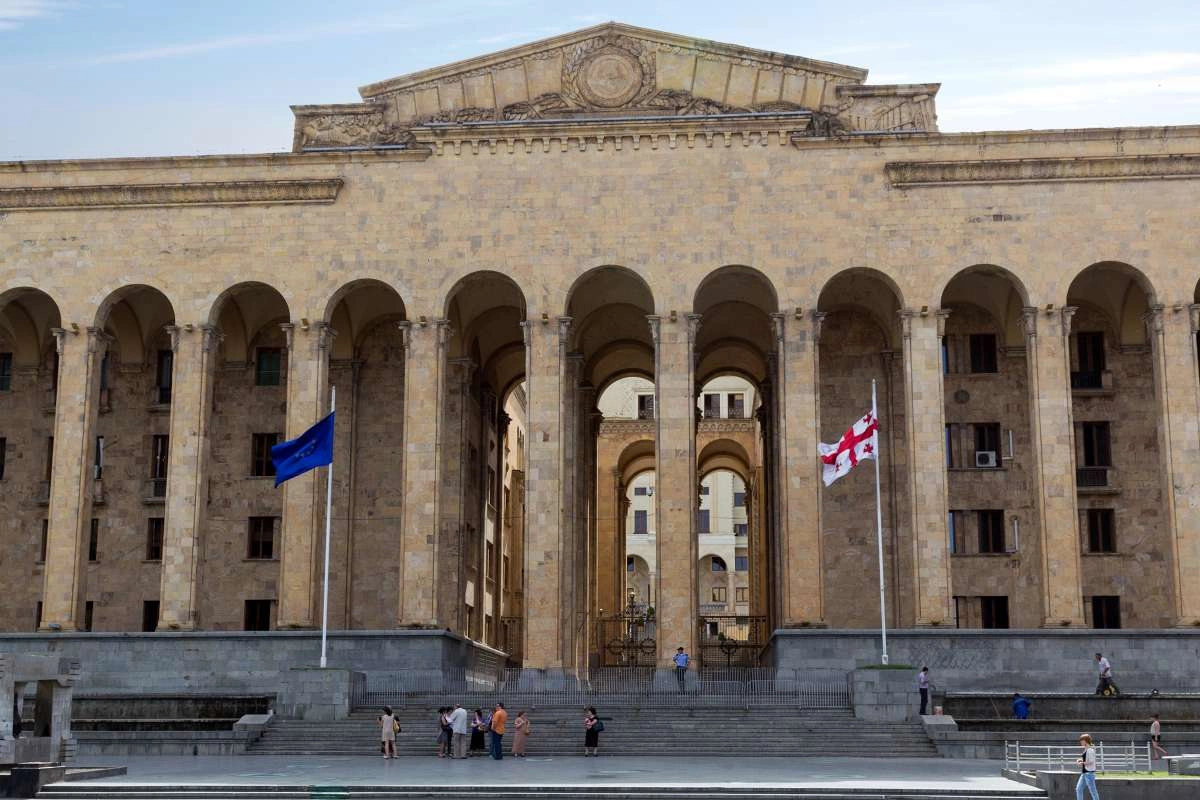
On 3 April, Mamuka Mdinaradze, Leader of the Parliamentary Majority, announced from the headquarters of Georgian Dream that the ruling party plans to reintroduce the so-called ‘Foreign Agent Law,’ now renamed the Draft Bill on ‘Transparency of Foreign Influence.’ Georgian Dream’s narrative has undergone a transformation, with a focus on transparency rather than categorizing CSOs as agents.
Image: Georgia's Parliament buillding in Tbilisi.
Last year's initiative stemmed from the pro-Russian GD proxy political group Power of People, which received support from the ruling party. However, it sparked large-scale protest rallies during 7-9 March, resulting in the unconditional withdrawal of the law by Georgian Dream. Given Georgian Dream's tendency to step back to quell protests, similar to their actions in 2019 when Ivanishvili promised a transition to a fully proportional parliamentary election model only to backtrack later, journalists last year asked Mdinaradze about the possibility of reintroducing the bill. He responded that it was impossible, citing the significant responsibility taken before Georgian society by withdrawing the initiative.
Purpose of the Initiative
Georgian Dream has long utilized polarization as its main electoral strategy since 2012, consistently capitalizing on societal fears—a tactic common in authoritarian regimes. While the prevailing narrative previously centred on thwarting the return of the United National Movement to power, the 2021 local elections marked a turning point. Georgian Dream suffered its first defeat to a UNM candidate in the Tsalenjikha Mayor race and lost the majority in the City Assemblies of several Municipalities in the Samegrelo region. Consequently, a new campaign emerged, with the ruling party crossing a red line by launching the "second front" and "global war party" campaigns. This initiative propagated conspiracy theories against Western allies, suggesting collaboration with the United National Movement to foment revolution and confront Russia. By embracing this propaganda, the ruling party jeopardized Georgia’s EU membership aspirations by refusing to implement EU recommendations for candidacy status. Despite gaining candidacy in 2023, Georgia lagged behind Ukraine and Moldova as a European Union troublemaker in 2022. Moreover, Georgian Dream introduced four legislative amendments and bills: the aforementioned foreign agent law, anti-LGBT constitutional amendments, elimination of gender quotas for parliamentary lists, and reduction of votes required for selecting the Chairperson of the Central Election Commission from 90 to 76; the latter two had already been adopted.
These actions serve three primary purposes:
1. Redirecting attention from pressing social and economic issues, primarily driven by inflation and low income in Georgia. Opinion polls conducted by US-based organizations such as IRI and NDI consistently highlight economic and social concerns as the top five issues for individuals or households, potentially driving thousands to migrate to the United States and Europe.
2. Bolstering the party's popularity among neoconservative and far-right voters in Georgia, who have been influenced by pro-Russian propaganda disseminated by political movements like Georgian March, Alliance of Patriots, and Alt-Info. Georgian Dream's narrative frequently emphasizes protecting family values, combating pseudo-liberal propaganda, shielding youth from LGBTQI+ messages, and preserving Georgian traditions and customs.
3. Exerting control over every aspect of political life in Georgia, including governmental bodies and the media. While the ruling party has significant influence, its reach extends to Civil Society Organizations (CSOs) and NGOs, which are esteemed and trusted not only within Georgia but also by international partners. Therefore, the proposed bill aims to partially regulate the activities of the NGO sector, despite their transparency and accessibility through organizational websites and the government-run platform, eAims.
Why This Is a Risky Gamble for Georgian Dream
The discussion of risks must be considered in two dimensions: the threat to Georgia’s EU integration and the potential danger for the ruling party to lose power after the 2024 Parliamentary elections.
In the first dimension, the laws and amendments initiated by Georgian Dream directly threaten democracy and human rights, essential conditions for Euro-integration. The EU Delegation to Georgia has stated that the initiative violates two out of nine recommendations outlined by the European Commission for granting Georgia Accession Negotiations.
In the second dimension, last year’s protest rallies showed that despite the prevailing belief that conservative voters constitute the majority, the threat to potential steps back from EU integration might not only concern liberal-minded citizens. Therefore, jeopardizing Georgia’s European future could have negative repercussions for the ruling party on Election Day.
What’s Next?
Speculations abound that the ruling party will delay the discussion and adoption of this bill, possibly until June, coinciding with the Georgian national football team's participation in EURO 2024. Meanwhile, CSOs are gearing up with action plans against the reintroduction of the Foreign Agents bill, setting the stage for a potentially heated spring in Georgia. As tensions escalate, the nation teeters on the brink of a pivotal moment—one that could shape its future trajectory for years to come.
This pivotal moment serves as a test for Georgian society's commitment to the path of European Integration and the protection of democratic values. As the nation grapples with the looming threat of regressive legislation and the potential erosion of hard-won freedoms, its response will be closely scrutinized not only by international observers but by future generations as well. The choices made today will reverberate far beyond the confines of political discourse, shaping the very essence of Georgian identity and its place on the global stage. In confronting this challenge, Georgia stands at a crossroads of political expediency and the threshold of its own destiny.
Share on social media